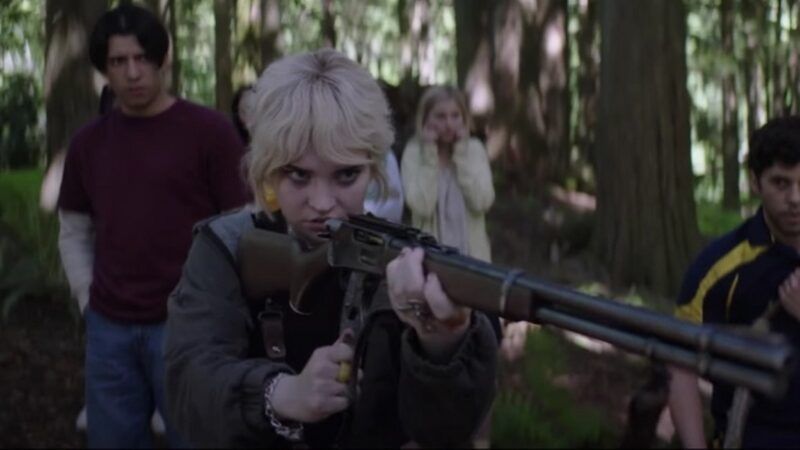Yellowjackets Wrings Thrills and Mystery Out of Tragedy and Survival
Showtime series follows the lives of teen girls who survived a plane crash.

Yellowjackets. Showtime. Sunday, November 14, 10 p.m.
Life is full of surprises, and not just about narwhals and the severed heads of sea slugs. You sit down to watch a TV show about a plane carrying a girls' soccer team that crashes in the middle of nowhere and—wait a second—this is not another Lord of the Flies remake at all. Well, not totally, anyway, or maybe even mostly. Showtime's new drama Yellowjackets is a lot of things, and the quickness with which the veneer of civilization rips away from teenagers is only one of them.
It's a murder mystery. It's a feminist fable. It's a political drama. It's a coming-of-middle-age story. It's a ghost story. (Maybe.) And it's a lot of fun to watch, no maybes about that.
The show simultaneously pursues two timelines. One is in 1996, when the Yellowjackets—New Jersey high school champs flying to a distant tournament—go down in a grisly plane crash that kills or cripples much of the team (and all the adults) and will leave the rest of the girls wandering in the wilderness for 19 months. The other is 25 years in the future, when a handful of the taciturn survivors learn somebody is stalking them through their self-imposed obscurity, seeking to learn what really happened after the plane went down.
The crash, of course, was regarded as a tragedy—not just for the loss of life, but the quality of the lives. "Some of these kids, no big loss, if we're honest," the principal, looking around his hallways, tells a reporter. "But those girls were special. They were champions." Not that everybody agrees. "Not one of those girls gave a good goddam about trigonometry," sniffs their math teacher.
The trig teacher may be closer to the truth. The hijinks at a party the night before the departure reveal the team is riven by cliques, rivalries, jealousies and excess affection for drugs and drinking. "Don't you have a bong to hit, or a dick to suck?" one of the model-student types snaps at the team punk during an argument.
The situation in their homes is not much better. One girl is being medicated for schizophrenia; another has to slap her drunken mother awake for a ride to the airport. When the plane goes down, it doesn't take long for these cracks to turn into crevices, bloody ones. Some of the girls survive the ordeal, but in the 2021 timeline, they all clearly have scars. They've changed names, fled to Unabomber-style shacks or otherwise gone to ground, buried in frumpy, joyless marriages or repetitive stints in rehab. None of them are the champions their principal predicted.
Shauna (Melanie Lynskey, Castle Rock), Brown-bound before the crash, wound up with a daughter who despises her and a husband whose idea of a sexual fantasy is for her to pretend to be one of his furniture customers. Team punk Natalie (Juliette Lewis), though out of the hospital at the moment, is still determinedly Amy Winehousing herself. Misty (Christina Ricci), the dorky and dateless team manager, is as clueless and needy about men as ever—but to compensate, she has a talking bird named Caligula and a job as the Nurse Ratched of a nursing home.
The only middle-aged Yellowjacket whose life has any of those championship qualities their principal foresaw is Taissa (Tawny Cypress, The Blacklist), a smooth operator both on and off the field. She's now a gay icon who's running for the state senate—and, not coincidentally, the mastermind of the plan, all those years back, for the girls to keep their mouths shut about what happened out in the woods.
But that plan seems to be going awry. Breaking her own rule by vaguely suggesting she was the hero of the crash (her ads boast that she'll "lead New Jersey out of the wilderness"), Taissa has run into an opponent who isn't afraid to exploit ancient and tawdry rumors about the aftermath: His ads warn a Taissa victory will result in "cannibalizing your tax dollars" and pile on lots of creepy images of roasting meat. While she prepares a counterattack, Taissa must also contemplate the difficulties of her troubled young son, whose disturbing and sometimes macabre drawings at school have alarmed his teachers.
Perhaps coincidentally (or perhaps not), somebody—or maybe two somebodies—is trying to contact the survivors and get them to talk. A counterfeit newspaper reporter is waving around a million-dollar book offer while anonymous but suggestive postcards turn up in the Yellowjackets' mailboxes.
That sounds like a lot of balls to keep in the air. But writer-producers Ashley Lyle and Bart Nickerson, who previously collaborated on the hardball Narcos shows about Latin American traffickers, do a good job of juggling their storylines and, even more importantly, keeping their characters consistent over a quarter of a century of story. Both scripts and actresses flow seamlessly through the different timelines. Lewis morphs from a cynic into a burnout, Ricci from a victim to a victimizer; Cypress turns from detestable student pol to dangerous professional while Lynskey finds the resolve to stop being a middle-aged punching bag for her family.
And the dialogue cuts like a knife. Says one girl, dismissing a prospective teenage suitor: "I once saw him get outsmarted by an escalator." Glad she wasn't around when I was in high school.


Show Comments (12)